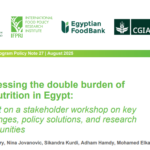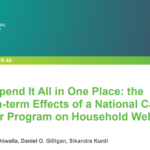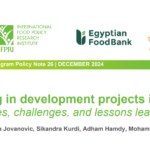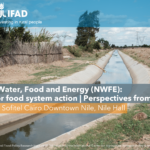Key messages Parliamentarians, researchers, and development practitioners shared perspectives on the double burden of malnutrition in Egypt in roundtable discussions. Infrastructure gaps and policy and research strategy fragmentation are highlighted as challenges to accessibility of healthy food. Aggressive ads/media environment and inefficient nutrition education programs are regarded as negatively impacting consumer behavior. Economic factors are widely identified as a major driver of malnutrition. Recommended solutions include raising nutrition literacy, transitioning from food subsidies to vouchers, improving nutrition services infrastructure, taxing unhealthy foods, and fortifying staple foods. Participants called for continued dialogue between researchers and policymakers.
NEW PUBLICATION: Don’t spend it all in one place: The medium-term effects of a national cash transfer program on household well-being
Cash transfer programs are often effective at increasing household consumption in their early years, but impacts become more nuanced over time as the use of transfers varies. This paper examines the medium-term effects of Egypt’s f lagship cash transfer program, Takaful, on several measures of household wellbeing using a regression discontinuity (RD) design
NEW PUBLICATION: Would you rather? Household choice between cash transfers or an economic inclusion program
We study households’ choice between continued cash transfers and a new economic inclusion program—two global prevalent social protection programs—offered by the Egyptian government. Lower-than-expected early adoption of the new program is correlated with differing perceptions on its design
NEW PUBLICATION: Targeting in development projects in Egypt: Approaches, challenges, and lessons learned
Effective targeting strategies are vital for almost all development programs. Universal approaches which provide aid to all individuals regardless of need are not always feasible given limited budgets and varying development priorities. Conversely, targeting directs resources to those in greatest need, ensures efficient allocation while upholding principles of social justice, equality, and the right to assistance.
The Nexus of Water, Food and Energy (NWFE): Entry points for Food System Action | Perspectives from Egypt
Water, energy and food security are important human development goals that are closely inter-connected. Food systems rely heavily on the availability of energy and high-quality water. This connection spans nearly every stage of production and agricultural value chains, including aspects such as labor and mechanization, agro-chemicals, cooling, and transportation.
- 1
- 2
- 3
- …
- 17
- Next Page »





